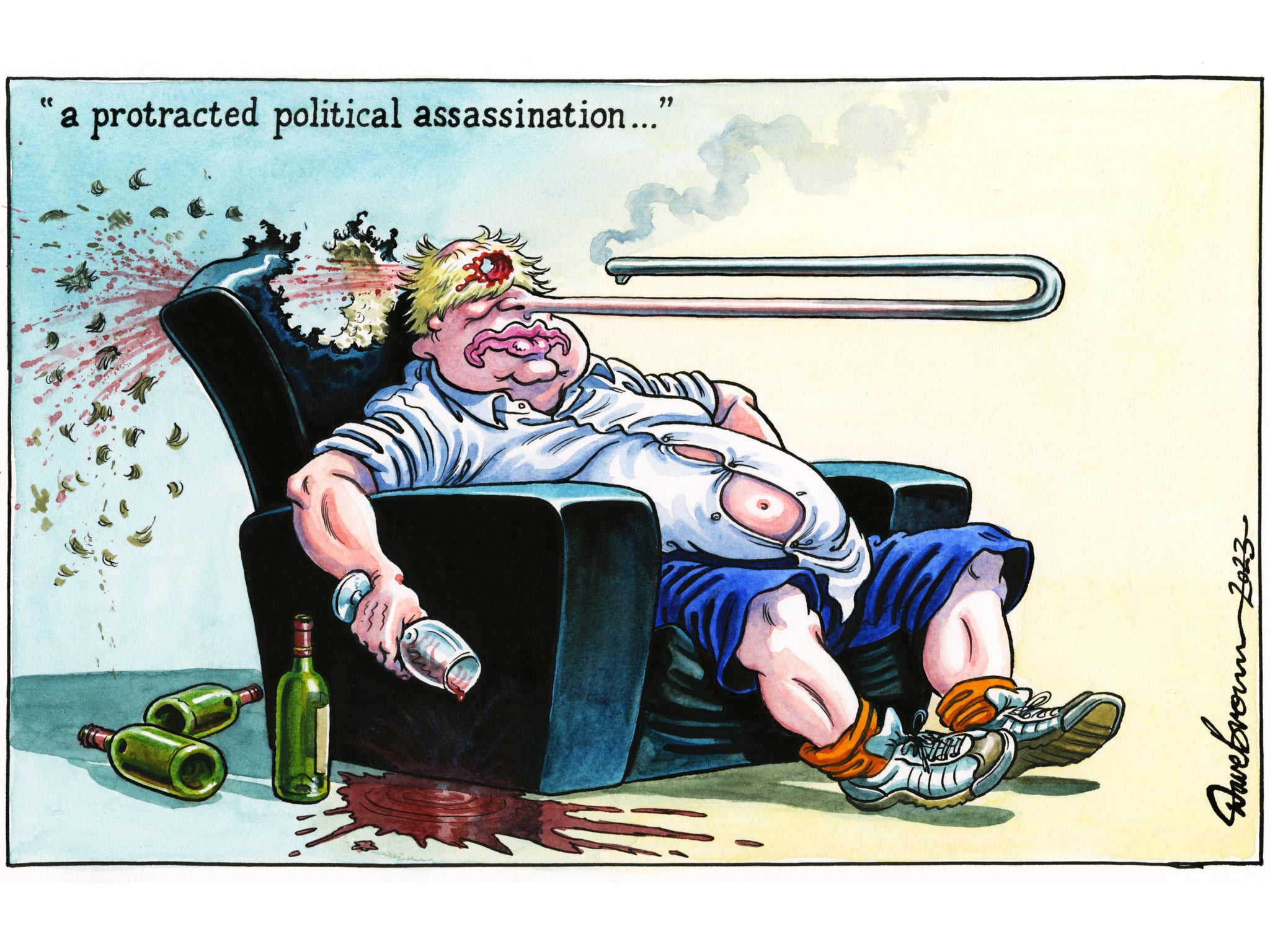At long last, Boris Johnson and his runaway lies have run out of road
Editorial: In the hothouses of politics, across the despatch box or in the television studios, the former prime minister’s tactics of bluster and obfuscation have served him well. In the cold, forensic climate of a sustained investigation, he has wilted

The dismal saga of Boris Johnson’s lies to parliament when he was prime minister has been impressively chronicled in the long-awaited report of the Commons committee of privileges. Such a report is unprecedented. It is historic. It is damning.
It is also fair.
Its recommendations are proportionate. They will end Mr Johnson’s political career, or at least, they should. Above all, the work of the members of the committee, many under the most sustained intimidation and attacks on their personal honesty, has helped to restore some confidence in the integrity of the Commons. It is a depressing thing that they needed extra personal security as they went about their task. But they persevered, and produced an independent report that is exemplary. It is a good day for parliamentary democracy. The system still works.
- Read our live coverage of reaction to the Partygate report here
On the evidence presented, the facts are not in doubt: Mr Johnson did indeed commit multiple contempts of parliament, both while he was prime minister and later when he was flailing around trying to rubbish the committee members’ probity. The proposed sanction of a 90-day suspension from the Commons, rendered otiose by Mr Johnson’s resignation, is consonant with the seriousness of his persistent breaches of the parliamentary rules.
This is not mere “process”. It matters, greatly. As the committee reminds us: “Our democracy depends on MPs being able to trust that what ministers tell them in the House of Commons is the truth. If ministers cannot be trusted to tell the truth, the House cannot do its job and the confidence of the public in our democracy is undermined.”
The committee is right to conclude that Mr Johnson’s “denials and explanations were so disingenuous that they were by their very nature deliberate attempts to mislead the committee and the House, while others demonstrated deliberation because of the frequency with which he closed his mind to the truth”. Bundles of evidence, adduced in carefully constructed argument supported by detailed footnotes and appendices, back up its dramatic words.
In short: it is far from a kangaroo court. Mr Johnson was afforded much the same treatment as others who have found themselves under scrutiny over the decades. The committee of privileges is accountable to the whole of the House of Commons. Further, the majority of its members are Conservatives. It is true that it is not a court of law, but then again, the process it oversees applies to any and all MPs who get into trouble.
Indeed, it would be inappropriate for a court to interfere in the way that a sovereign parliament runs its affairs, under the established doctrine of exclusive cognisance. In any case, Mr Johnson was able to see an interim report and a draft final report, to offer his own evidence, and to argue his own case in public. He also benefited from the best legal advice taxpayers’ money can buy. He’s got nothing to complain about.
The irony of so many of Mr Johnson’s supporters is that they ask for different rules to be applied to him – a higher standard of proof. The committee had no need to look inside Mr Johnson’s head – a hazardous expedition even if feasible – to reach its conclusions, given the evidence and the balance of probabilities that he knew exactly what he was doing. Covid rule-breaking was endemic, he was at certain gatherings, and the official “guidance” and assurances he claimed as alibis in the Commons turned out to be nothing of the sort. They were even partially withdrawn by Mr Johnson’s lawyers following his oral testimony to the committee.
A defiant Mr Johnson has increasingly descended into denialism and Trumpian tactics. Not once has he disputed the actual evidence assembled by the committee, and he can only defend himself with attacks on some of its members – even though the report and its sanctions have to be approved and adopted by way of a vote in the House of Commons.
In a political argument, in the hothouses of politics, across the despatch box or in the television studios, Mr Johnson’s standard tactics of bluster, distraction, evasion and obfuscation have served him well. In the cold, forensic climate of a sustained parliamentary investigation, he has wilted. Those cultivated recent images of him sweating away, jogging around his newly acquired mansion in Oxfordshire, are in fact a fine metaphor for a man trying to escape from reality and running out of road.
The truth has finally caught up with him. On Monday, the Commons will meet to do what the leader of the House, Penny Mordaunt, calls “its sad duty” and consider what the committee of privileges has found. It seems likely that it will condemn him. He, and he alone, has chosen not to be there to plead his case.
Despite all his efforts, then, Mr Johnson did not break the British constitution. He tried to prorogue parliament unlawfully, but was thwarted by an independent Supreme Court. He tried to subjugate the Treasury to No 10 but failed. He lied to parliament but he has not been allowed to get away with it. Instead, the forces of parliamentary democracy have destroyed him.






Join our commenting forum
Join thought-provoking conversations, follow other Independent readers and see their replies
Comments